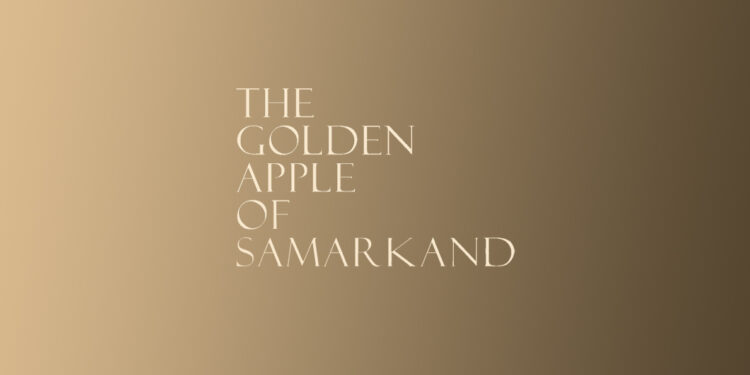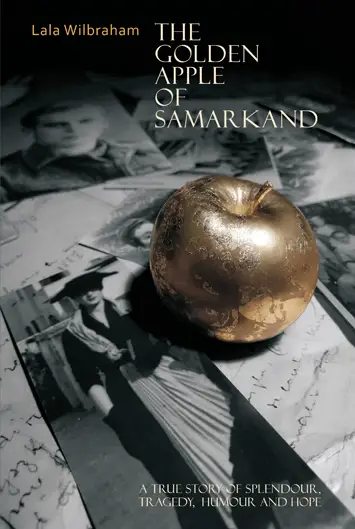The Golden Apple of Samarkand by Lala Wilbraham – Review

By Sandra Callard
This book is a gorgeous and momentous epic by any standards. It follows the huge changes that have occurred over the last 150 years or so in one particular family, covering roughly the years from the 1850s to the present day. It follows a wealthy family of Polish/Lithuanian descent, with the author, Lala Wilbraham, being a direct descendent of that family. Wilbraham tells the story from the memories of her relatives and her own memories and extant documents of her large and close family, who went from huge wealth to poverty during the two World Wars. The home of the author’s paternal family was a luxurious and safe Eastern European estate and was her paternal grandmother’s ancestral home. Its name was Lentvaris.
Wilbraham’s book is entirely personal and her remarkable, amusing and often shocking story is told through the glorious highs of the pre-1900s when her family, and especially her Grandmother, Roza, told her stories of the golden days of pleasure when Lentvaris rang to the sound of song, laughter and money.
The horrors of the two World Wars would banish this world forever as Lentvaris was crushed between the advancing Nazis from Germany and the Bolsheviks from Russia, as they attempted to wipe Poland off the face of the Earth. Life became brutal and agonising as the family tried to cope with the horrific camps they were sent to. People now are aware of the sadistic and savage treatment that the Nazis meted out, but Wilbraham approaches it primarily from the point of view of her relatives and how they coped through faith, stubbornness and hope, which seemed to proliferate in their DNA.
 We are taken step by step through the breakdown of the happy and easy home life of Lentvaris at the approach of the Germans and the Russians, and the fear and the heartbreak of these once happy and prosperous families. Wilbraham never knew those times, being born in 1950, but has lived them again through her family, and now we also will follow her. It is real and hard and sad to read, but is occasionally broken up by some lightness that even in those dark times can be found.
We are taken step by step through the breakdown of the happy and easy home life of Lentvaris at the approach of the Germans and the Russians, and the fear and the heartbreak of these once happy and prosperous families. Wilbraham never knew those times, being born in 1950, but has lived them again through her family, and now we also will follow her. It is real and hard and sad to read, but is occasionally broken up by some lightness that even in those dark times can be found.
“Monumental”
The author goes to great lengths to assist the reader in understanding the life and times of her family, and this is spectacularly achieved when she is talking about the days of her Grandmother’s youth. A different time and place is resurrected again as we are transported to an era we will never see, except in our imagination, and the author achieves this with ease. She also helps those not familiar with Poland and its surroundings, whose knowledge of the Polish/Lithuanian languages is perhaps scant. She runs a section on pronunciation, but l would hope that other readers would have more success with it than l did. A baffling, but visually beautiful language, and surely one of the world’s most difficult. Wilbraham, and most of her family, are great linguists, so must certainly despair at such ineptness.
This fascinating story is extremely personal to the author, and the many instances of family bonding and caring is quite emotional to read, and it does seem to be prolific and natural amongst the family. Whenever anything bad happens to a family member it seems that other members step in to help put things right, and to a massive degree. They think nothing of moving another family, lock, stock and barrel, into their own house if a member falls on hard times. They will take the place of a parent if a child is left alone, and also, massively, they will give their own money to help an ailing member. The speed and the caring that seems to occur in and around Poland, and which is transferred with them wherever they travel, seems to be never ending, and it is lovely to see.
The scope of this book is monumental. Over the years the family have moved around Eastern Europe, lived in Argentina, Brazil, France and England, and it appears that this family can adapt and succeed in any country they decide to live in. They have moved and settled around the globe, some by choice, some by force and some because it was better than where they were, with the author now settled in England with her English husband.
l loved the title of the book. The Golden Apple of Samarkand means it is a hopeful sign when things go wrong, and the family of Lala Wilbraham have lived and died by this adage. Perhaps we can all learn from it. This is a book to be read and re-read, as its proportions are too immense to absorb within one publication. The Polish way of life of those bygone ages are gone forever, and it takes some skill to conjure them up for a modern audience, but it is well worth the try, and Lala Wilbraham has succeeded massively in conveying the agonies and the ecstasies of pain and heartbreak, of life and death, but also the beauty of family love that can carry us through almost anything.
‘The Golden Apple of Samarkand’ by Lala Wilbraham is published by Unicorn, £25 hardback
It can be ordered direct from the publishers unicornpublishing.org for immediate dispatch









